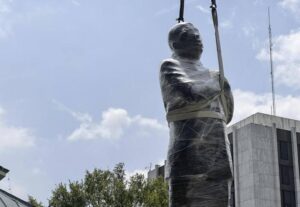Zumbi represents a powerful symbol of resistance for the Afro-Brazilians and all persons of African origin. When the Portuguese tried to subdue his people, he was always there to resist them by all means.
Origin
He’s said to be of noble origin as his mother, Sabina, was the sister of Ganga Zumba who (the grandson of an unknown King of Kongo.)
It’s widely believed that Zumbi’s relations were carted away to the Americas after they lost the battle of Mbwila to the Portuguese. 15,000 men were butchered in that attack and the Portuguese captured the King, his family and several nobles. Many historians believe Ganga and Sabina were among these noble men who were captured.
Zumba and his family were made slaves at a plantation in Brazil for a while. From there, they managed to escape to Palmares.
Early life
Zumbi was born a free man in 1695 in Quilombo dos Palmares, Pernambuco, Brazil. Quilombo dos Palmares was home to African runaways from Brazilian farms (Quilombo is a Mbundu name from Angola meaning ‘warriors camp’). Most of those Africans from the Kingdom of Kongo escaped to this town and it became famous for its long and fierce resistance against Portuguese oppression.
Member’s of the Quilombo community often returned to the towns and plantations to encourage their fellow Africans to escape and join them. Those who refused were sometimes captured and forcibly brought to Quilombo. Often, they vandalized the Portuguese plantations.
The people of Quilombo, considered anyone who came on his own a free man. However, those Africans who were forced to Quilombo, were treated as slaves and remained so until they bring in another captive.
When Zumbi was only 6 years old, he was captured and given to Antonio Melo, a missionary. He was baptized, given the name Francis and also taught Portuguese and Latin.
Despite attempts to keep him under control and make him ‘civilized’, at age 15, he managed to escape and returned to his birthplace of Quilombo dos Palmares – where his uncle Zumba was king. He became famous for his physical prowess and battle skills. By the time he turned 20, he was already a well respected military specialist.
In 1675 at the age of 20, he bravely led the Quilombolas against a Portuguese incursion. Employing some special tactics thanks to Zumbi’s military prowess, they heroically defeated the aggressors in that battle.
King Zumba
By 1678, the Governor of the captaincy of Pernambuco tired of the long term conflict with Quilombo offered a truce to King Zumba of Quilombo. Zumba initially agreed to the terms of the truce on the condition that the runaway slaves in Quilombo would be left alone. The deal included submission to Portugal and discontinuance of the hosting of any new runaway slaves to which Zumbi strongly disagreed with.
At the time, Zumbi who was the military leader of Quilombo, distrusted the Portuguese and rejected any deal that would include the continued enslavement of Africans. He challenged the King’s acceptance of the arbitrary deal with the Portuguese and by 1697, Zumbi killed his Uncle Zumba and became King.
King Zumbi’s reign
Under Zumbi’s rule, Quilombo dos Palmares became a force to recon with in the struggle for freedom from slavery.
He adopted more aggressive approach against the Portuguese slavers. He quickly became famous for his strong determination and resolve to end Portuguese oppression in Brazil. As expected, tensions between Quilombo and Portugal took on a new dimension.
Fifteen years later, the Portuguese launched a serious offensive against King Zumbi and his people. Even with the aid of artillery, and the help of some native Indian warriors, it took them 42 days to defeat the Kingdom.
On February 6, 1694, the Portuguese managed to destroy the Kingdom of Quilombo after 67 long years of resistance from its people. Zumbi managed to escape at first, offering some resistance still. However, on November 20, 1695, he was killed and his body decapitated. His head was put in a spike to prove that he was not immortal and as a deterrent to any new rebellion.
Though it was eventually subdued, Quilombo’s long term resistance to Portuguese colonialism served as a beacon of hope for resistance to slavery.
Significance of Zumbi’s legacy
November 20 is set aside annually in Brazil as a day of celebration of the heroic legacy of Zumbi. It is marked as a day of Afro-Brazilian consciousness.
Being one of the pioneers of African resistance to slavery, his legacy has a special significance for people of African descent. They remember him as a hero and an icon of freedom. He is a National hero in Brazil and one of the most important Africans of all time.



